Information about AWF
HISTORY
Poznań University of Physical Education is the oldest school of physical education in Poland and one of the oldest schools in Europe. The University educates specialists in physical culture, tourism, rehabilitation, dietetics, neurobology and is also a respected research institution, carrying out research on the natural science and humanistic foundations of physical culture and rehabilitation.
The history of the Poznan University of Physical Education goes back to 1919 and the Department of School Hygiene and Theory of Physical Education at the newly created Poznan University. The Department was the first academic centre in Poland to train physical education specialists. The first head of the Department was professor Eugeniusz Piasecki. In 1922 the Department was included in the Medical Faculty of the University. It soon gained autonomy and became the College of Physical Education with the right to confer masters degrees.
After the Second World War, on the 15th of April 1945, the College inaugurated a new academic year. At the turn of 1949 the higher School of Physical Education was established. Its development led to organisational changes and on the 1st January 1973 the school was granted the status of the University School of Physical Education. In June 1982 the Senate of the University decided to name the University after professor Eugeniusz Piasecki, the "father of the theoretic sciences in the field of physical education".
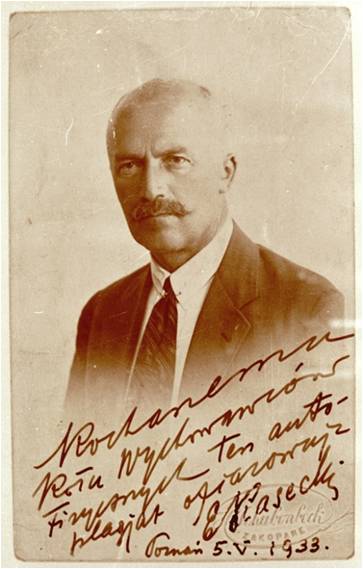
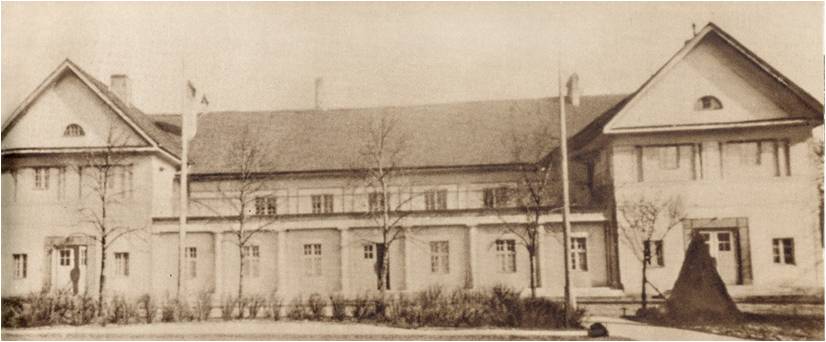
The University has been active in the field of sport at all stages of its development with students engaging in gymnastics, athletics, swimming, team sports, water sports, martial arts and many other sports as part of academic sport and in the University Sports Association club.
The students of the University included many excellent athletes, participants of the Olympic Games and Olympic medallists:
Gold medallists:
Silver medallists:
Bronze medallists:
At the Olympic Games in Sydney in 2000, the University was represented by 11 students, including seven from the Department of Physical Education, Sport and Rehabilitation in Poznań and four from the Department of Physical Culture at Gorzów Wielkopolski Campus. They were:
from Poznań:
- foilist Sławomir Mocek – 4th place;
- rower Michał Wojciechowski – 8th place in quadruple sculls;
- kayakers: Elżbieta Urbańczyk – 4th place and Michał Gajownik – 4th place;
- field hockey players: Zbigniew Juszczak, Krzysztof Wybieralski, Maciej Matuszyński,
from Gorzów Wielkopolski:
- rowers Tomasz Kucharski – gold medallist in double sculls; Rafał Głażewski – 4th place in flatwater kayaking;
- Greco-Roman wrestlers: Marek Garmulewicz – 4th place and Dariusz Jabłoński – semi-finalist.
Students of the Poznan University of Physical Education represented Poland at the Olympic Games in Athens in 2004. They were: Tomasz Kucharski (gold medallist), Magdalena Kemnitz and Sławomir Kruszkowski – rowing, Monika Drybulska – marathon.
At the Olympic Games in Beijing in 2008 our University was represented by:
- Julia Michalska and Patryk Brzeziński in rowing;
- Małgorzata Chojnacka in kayaking;
- Sławomir Mocek in foil fencing;
- Anita Włodarczyk, Monika Drybulska, Kamil Masztak and Tomasz Szymkowiak in athletics.
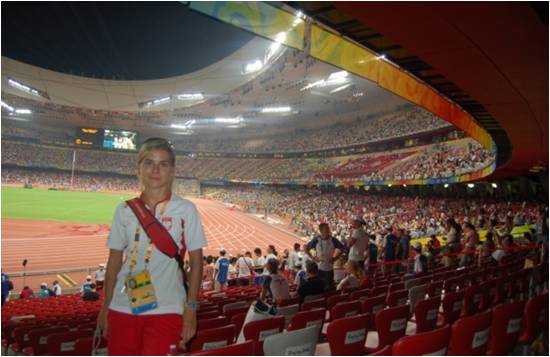
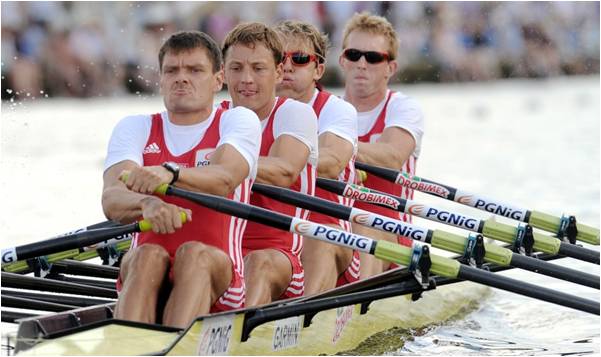
The Sydney Paralympic Games in 2000 were a success for our students:
- Anna Szymul, who won silver medals in 100 m and 400 m sprints and a bronze medal in 200 m,
- Mirosław Pych, who won a gold medal in javelin throw and a gold medal in modern pentathlon.
Outstanding martial arts athletes were our students Robert Nowak, the 1999 world vice champion in kickboxing and 2000 full-contact world champion and Wojciech Bloch in karate.
In 2009 at the World Athletics Championships in Berlin our student Anita Włodarczyk broke the world record in hammer throw and won the title of the World Champion. At the World Rowing Championship which took place in Poznań in 2009 our students Julia Michalska and Magdalena Fularczyk won the first gold medal in the history of women rowing in Poland and the titles of the World Champions and in 2010 they won a bronze medal at the World Championships in New Zealand.
The leading sport disciplines popular among students of the Poznań University of Physical Education are water sports (kayaking and rowing), martial arts (taekwondo, kickboxing, traditional karate), athletics, field hockey and fencing.The University provides higher education in physical culture and tourism for the purposes of physical education, sport, physiotherapy, tourism and recreation. It is also a leading research centre, which carries out studies in the fields related to the areas of study, mainly in humanistic and natural science foundations of physical culture and tourism. The University School cooperates with many universities abroad, participates in European educational programmes (ERASMUS+) and is a member of international scientific organisations.
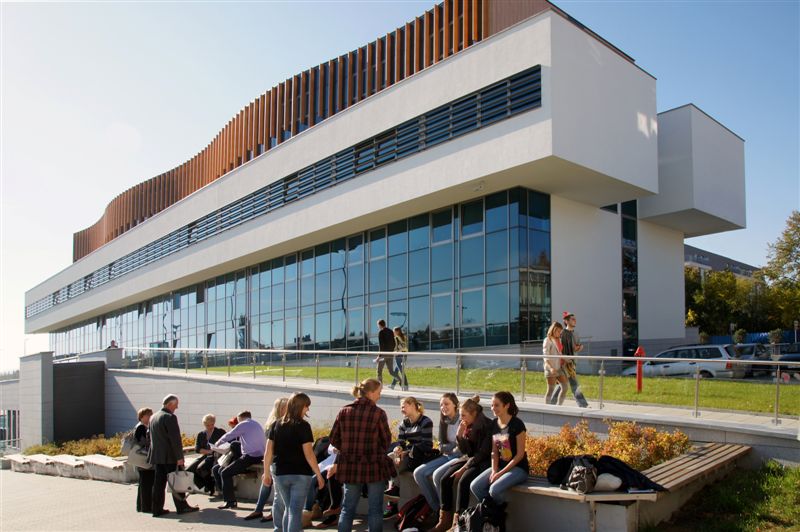
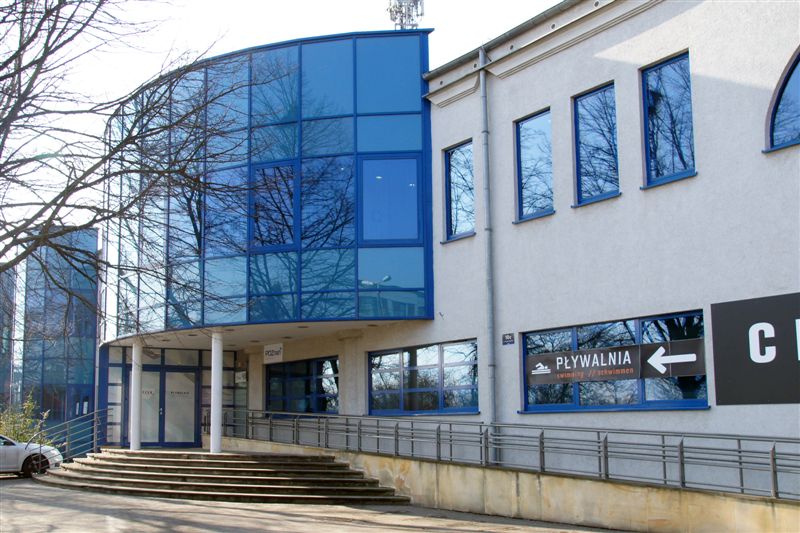
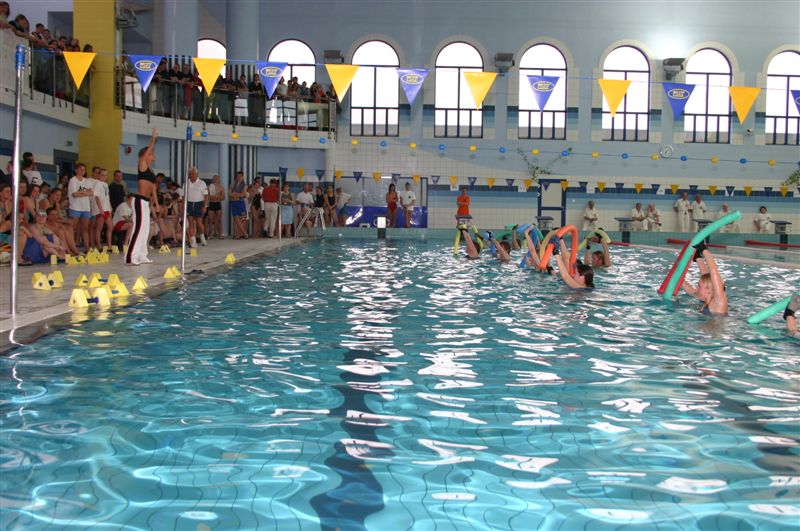
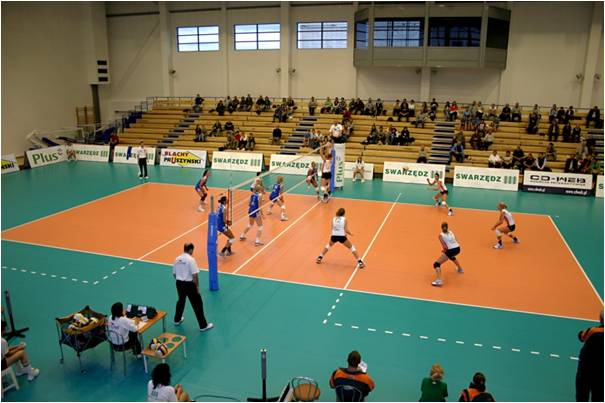
International Exchange
International Relations Office
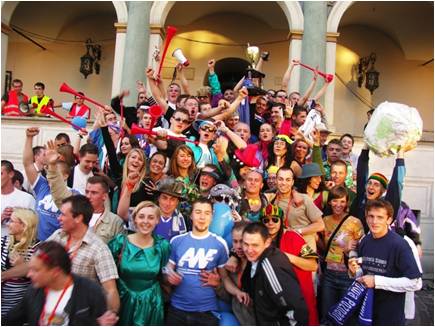 International Relations Office at the Poznań University of Physical Education promotes the idea of mobility and organises student exchange. Student exchange, both during the studies and practical placements, complements the curriculum of study at our university and provides an opportunity to gain new experience, both academically and in social and cultural aspects.
International Relations Office at the Poznań University of Physical Education promotes the idea of mobility and organises student exchange. Student exchange, both during the studies and practical placements, complements the curriculum of study at our university and provides an opportunity to gain new experience, both academically and in social and cultural aspects.
Every year we offer to our students scholarships and placements abroad as part of various scholarship programmes – Erasmus+, Physical Education & Sports Academy Gerlev/Denmark, the Martial Arts Academy of Bosei/Denmark, DAAD (German Academic Exchange Service) and BUWIWM (Bureau for Academic Recognition and International Exchange).The Poznań University of Physical Education is a leading Polish sport university in terms of Erasmus activity. Students take part in partial studies in 50 most eminent European universities and take part in practical placements abroad in institutions of the profile compatible with the curriculum of studies.
The objective of the international exchange between universities all over the world is to improve the quality of teaching by developing international cooperation and to support student and staff mobility. The benefits of going abroad foreign not only strengthen the motivation for studying, but also contribute to students resourcefulness and independence. On encountering a new reality students gain more self confidence and become more open for new opportunities. At the same time they learn to respect other cultures and traditions, improve their command of foreign languages and become real Europeans.
The Careers Office
Are you looking for a job? Do you want to work as a volunteer? Do you want to take part in workshops, courses or job fairs? Come to the careers office!
An offer for students and graduates includes:
- permanent, temporary and holiday jobs in Poland and abroad,
- practical placement, voluntary work,
- meetings with employers,
- training courses, workshops on how to write your application, how to prepare to a job interview as well as workshops on self-presentation and self-employment,
- information materials on the perspectives of professional development, training opportunities.
Contact:
AWF Main Building, ul. Królowej Jadwigi 27/39 entrance A, room 204
tel./fax 61 8355104, ,
www.biurokarier.awf.poznan.pl
Students
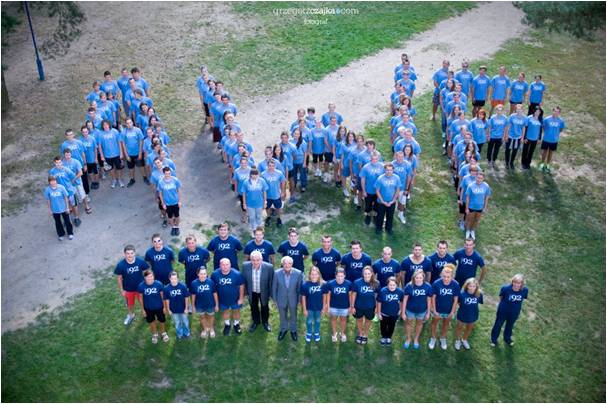 Currently, the Poznań University of Physical Education has around 4000 students, half of whom are full-time students.
Currently, the Poznań University of Physical Education has around 4000 students, half of whom are full-time students.
Teaching Staff
The University employs around 350 academic teachers including 61 professors and associate professors. The faculty of physiotherapy also employs specialists in clinical courses from the Poznan University of Medical Sciences.
Scientific Research
The University departments and institutes conduct scientific research financed by the Ministry of Science and Higher Education and supported by other funds, in cooperation with many research centres in Poland and abroad. Scientific research focuses on a few basic areas, including selected features of the Polish population, factors determining physical agility and sports results, socio-historical and cultural conditions of physical culture development, the role of exercise as a preventive and therapeutic factor in metabolic diseases, pedagogy of leisure, community determined development of tourism and recreation.
Scientific Publications
Every year the University publishing house publishes about 30 new titles. These include manuals and academic texts, monographs and periodicals, including “Trends in Sport Sciences” (in English), indexed by the EBSCO Publishing, Inc and Ulrich's International Periodical Directory. So far, over seven hundred books have been published. University publications are presented at least twice a year at science book fairs and also at national and international exhibitions.
The University library
T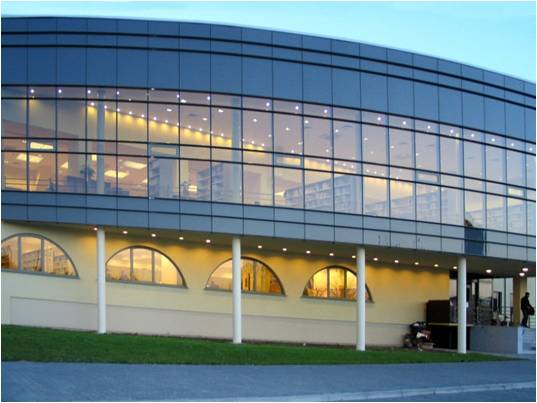 he University library network resources contain more than 80,000 volumes of books, journals, maps and audiovisual materials. The Library also subscribes to 175 current journals and newspapers. The collection focuses on physical culture, sport, physiotherapy, tourism and hospitality.
he University library network resources contain more than 80,000 volumes of books, journals, maps and audiovisual materials. The Library also subscribes to 175 current journals and newspapers. The collection focuses on physical culture, sport, physiotherapy, tourism and hospitality.
The library, which since 2004 has been located in a new, modern building, provides also access to bibliographic and full-text databases, containing thousands of electronic books, journals and other documents. Wifi and 34 computers are available in the Reading Room, Research Information Centre and Circulation Desk.
Student Organisations
Student Research Clubs
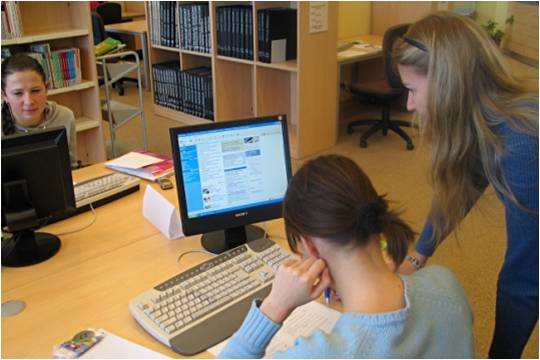 Each university should stimulate students to do research. For the majority of students however, taking part in lectures, seminars, classes and consultations with their tutors when writing the MA theses are enough to prove that science is not their passion. However, there are students who do not want to be minimalists. They take advantage of their studies to develop their professional competences and gain scientific knowledge. Their research interests are specific and they want to develop them.
Each university should stimulate students to do research. For the majority of students however, taking part in lectures, seminars, classes and consultations with their tutors when writing the MA theses are enough to prove that science is not their passion. However, there are students who do not want to be minimalists. They take advantage of their studies to develop their professional competences and gain scientific knowledge. Their research interests are specific and they want to develop them.
Student research movement gives them this opportunity.
The activity in student research clubs can prepare for future research work. Many eminent professors started their careers in student research clubs. Work in a student research movement is also an advantage when writing an MA thesis, applying for doctoral studies, writing scientific articles, gaining new professional experience etc.
Student research movement at the Poznań University of Physical Education was initiated in 1967. The authorities of the University fully recognise its significance and thanks to their support and the commitment of the University staff who are coordinators of research clubs, the movement is steadily developing.
At the moment there are fourteen research clubs at the Poznan University of Physical Education. To join them you have to contact a coordinator of a Student Research Club. You can start your activity in a research club as soon as in your first year. Do not waste your chance to spend your free time in a wise and interesting way.
Sport Camps
Summer camp - Chycina
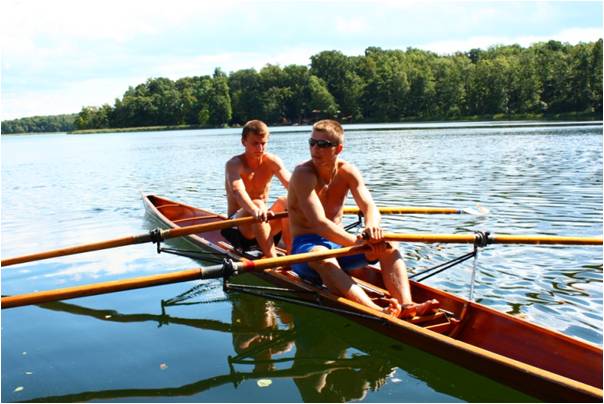 The legendary, compulsory summer camp in the University training centre in Chycina, that you will remember years later. During the 12-day camp students become familiar with the principles of organisation and running of camps, children summer camps, school field trips. Excellent location at a lake provides great conditions for students to improve their practical skills in kayaking, rowing, water-skiing, swimming in open water, diving, field games, camping and leisure time organisation.
The legendary, compulsory summer camp in the University training centre in Chycina, that you will remember years later. During the 12-day camp students become familiar with the principles of organisation and running of camps, children summer camps, school field trips. Excellent location at a lake provides great conditions for students to improve their practical skills in kayaking, rowing, water-skiing, swimming in open water, diving, field games, camping and leisure time organisation.
Winter Camp
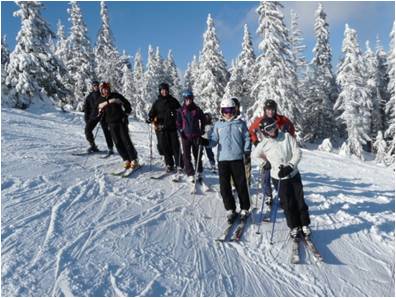 Skiing and snowboarding are the most popular forms of winter sport and recreation. Each graduate of the Poznan University of Physical Education should acquire the knowledge and skills necessary to participate in skiing and snowboarding, as they will certainly become handy in future work and in private life.If you are not a skier or snowboarder yet, you will become one at this camp! The purpose of the camp is to obtain or, for those who have tried it before, to improve basic skiing and snowboarding skills. This paves the way for further training, including acquiring instructor qualifications. During the camp students become familiar with the principles and specificity of organising winter camps.Students can choose their preferred location of camp – the Alps (Austria, Italy) or the Karkonosze mountains (Karpacz) – and the sport they want to do (skiing or snowboarding). Irrespective of your choice, you can start to learn from scratch in a beginner group or improve your skills in an advanced group. All classes are run by experienced University instructors. Students who choose snowboarding will be able to obtain qualifications of the Polish Snowboarding Association (PSZ, level 1, 2, 3). This is your passport to obtaining the PZS qualification of physical recreation instructor specialising in snowboarding.
Skiing and snowboarding are the most popular forms of winter sport and recreation. Each graduate of the Poznan University of Physical Education should acquire the knowledge and skills necessary to participate in skiing and snowboarding, as they will certainly become handy in future work and in private life.If you are not a skier or snowboarder yet, you will become one at this camp! The purpose of the camp is to obtain or, for those who have tried it before, to improve basic skiing and snowboarding skills. This paves the way for further training, including acquiring instructor qualifications. During the camp students become familiar with the principles and specificity of organising winter camps.Students can choose their preferred location of camp – the Alps (Austria, Italy) or the Karkonosze mountains (Karpacz) – and the sport they want to do (skiing or snowboarding). Irrespective of your choice, you can start to learn from scratch in a beginner group or improve your skills in an advanced group. All classes are run by experienced University instructors. Students who choose snowboarding will be able to obtain qualifications of the Polish Snowboarding Association (PSZ, level 1, 2, 3). This is your passport to obtaining the PZS qualification of physical recreation instructor specialising in snowboarding.
Zespół Tańca Ludowego AWF Poznań
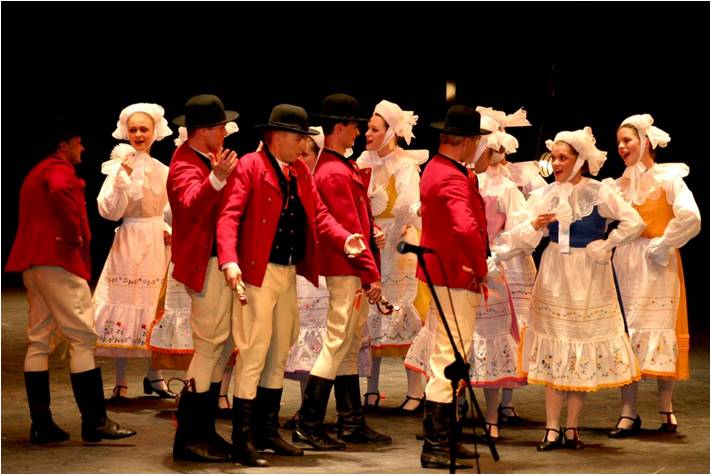 “Poznan AWF" Folk Dance Ensemble was established in 1982. Since its establishment it has been managed by Dariusz Majchrowicz. Ensemble members are students of the Poznań University of Physical Education and other universities in Poznań, secondary school students and other adults who share their interest in folklore. The ensemble aims to preserve national traditions and customs. The band is composed of six musicians (violin, clarinet, accordion and double bass).The ensemble has performed in many countries in Europe and worldwide. It has organised folklore festivals and the "Integracje 2001" and "Integracje 2002” World Folklore Festivals. Students work really hard practising their dancing skills. Dancing on the stage in Poland and abroad they prove that folklore can be attractive. The organisation of the “Integracje” World Folklore Festival is how they combine hard work with their passion for dancing. Friendships which started during dancing practice sometimes last for life.
“Poznan AWF" Folk Dance Ensemble was established in 1982. Since its establishment it has been managed by Dariusz Majchrowicz. Ensemble members are students of the Poznań University of Physical Education and other universities in Poznań, secondary school students and other adults who share their interest in folklore. The ensemble aims to preserve national traditions and customs. The band is composed of six musicians (violin, clarinet, accordion and double bass).The ensemble has performed in many countries in Europe and worldwide. It has organised folklore festivals and the "Integracje 2001" and "Integracje 2002” World Folklore Festivals. Students work really hard practising their dancing skills. Dancing on the stage in Poland and abroad they prove that folklore can be attractive. The organisation of the “Integracje” World Folklore Festival is how they combine hard work with their passion for dancing. Friendships which started during dancing practice sometimes last for life.
Contact:
Zespół Tańca Ludowego „Poznań”
Akademii Wychowania Fizycznego
Dom Studencki AWF
ul. Św. Rocha 9
61-142 Poznań Zespół Tańca Ludowego AWF Poznań
tel. 61 835 54 34; +48 504 226 408
email:
www.ztl.awf.poznan.pl
videoblog: www.ztlpoznan.blox.pl/html
www ŚPF INTEGRACJE: www.festiwal.awf.poznan.pl
Promotional video:
http://www.youtube.com/watch?v=U6acKpbv0Yw
Art director: Dariusz Majchrowicz
The history of the Poznan University of Physical Education goes back to 1919 and the Department of School Hygiene and Theory of Physical Education at the newly created Poznan University. The Department was the first academic centre in Poland to train physical education specialists. The first head of the Department was professor Eugeniusz Piasecki. In 1922 the Department was included in the Medical Faculty of the University. It soon gained autonomy and became the College of Physical Education with the right to confer masters degrees.
After the Second World War, on the 15th of April 1945, the College inaugurated a new academic year. At the turn of 1949 the higher School of Physical Education was established. Its development led to organisational changes and on the 1st January 1973 the school was granted the status of the University School of Physical Education. In June 1982 the Senate of the University decided to name the University after professor Eugeniusz Piasecki, the "father of the theoretic sciences in the field of physical education".


The University has been active in the field of sport at all stages of its development with students engaging in gymnastics, athletics, swimming, team sports, water sports, martial arts and many other sports as part of academic sport and in the University Sports Association club.
The students of the University included many excellent athletes, participants of the Olympic Games and Olympic medallists:
Gold medallists:
| Władysław Komar | athletics | Munich | 1972 |
| Tadeusz Ślusarski | athletics | Montreal | 1976 |
| Bronisław Malinowski | athletics | Moscow | 1980 |
| Władysław Kozakiewicz | athletics | Moscow | 1980 |
| Andrzej Wroński | wrestling | Atlanta | 1996 |
| Ryszard Wolny | wrestling | Atlanta | 1996 |
| Włodzimierz Zawadzki | wrestling | Atlanta | 1996 |
| Tomasz Kucharski | rowing | Sydney, Athens | 2000, 2004 |
| Michał Jeliński | rowing | Beijing | 2008 |
Silver medallists:
| Wiesław Maniak | athletics | Tokyo | 1964 |
| Andrzej Głąb | wrestling | Seoul | 1988 |
| Piotr Stępień | wrestling | Barcelona | 1992 |
| Rafał Szukała | swimming | Barcelona | 1992 |
| Jerzy Brzęczek | football | Barcelona | 1992 |
| Jacek Fafiński | wrestling | Atlanta | 1996 |
| Anita Włodarczyk | athletics | London | 2012 |
Bronze medallists:
| Kazimierz Zimny | athletics | Rome | 1960 |
| Andrzej Badeński | athletics | Tokyo | 1964 |
| Ryszard Katus | athletics | Munich | 1972 |
| Lucyna Langner-Kałek | athletics | Moscow | 1980 |
| Grzegorz Nowak | rowing | Moscow | 1980 |
| Izabela Dylewska | kayaking | Seoul | 1988 |
| Artur Wojdat | swimming | Barcelona | 1992 |
| Józef Tracz | wrestling | Atlanta | 1996 |
| Julia Michalska | rowing | London | 2012 |
At the Olympic Games in Sydney in 2000, the University was represented by 11 students, including seven from the Department of Physical Education, Sport and Rehabilitation in Poznań and four from the Department of Physical Culture at Gorzów Wielkopolski Campus. They were:
from Poznań:
- foilist Sławomir Mocek – 4th place;
- rower Michał Wojciechowski – 8th place in quadruple sculls;
- kayakers: Elżbieta Urbańczyk – 4th place and Michał Gajownik – 4th place;
- field hockey players: Zbigniew Juszczak, Krzysztof Wybieralski, Maciej Matuszyński,
from Gorzów Wielkopolski:
- rowers Tomasz Kucharski – gold medallist in double sculls; Rafał Głażewski – 4th place in flatwater kayaking;
- Greco-Roman wrestlers: Marek Garmulewicz – 4th place and Dariusz Jabłoński – semi-finalist.
Students of the Poznan University of Physical Education represented Poland at the Olympic Games in Athens in 2004. They were: Tomasz Kucharski (gold medallist), Magdalena Kemnitz and Sławomir Kruszkowski – rowing, Monika Drybulska – marathon.
At the Olympic Games in Beijing in 2008 our University was represented by:
- Julia Michalska and Patryk Brzeziński in rowing;
- Małgorzata Chojnacka in kayaking;
- Sławomir Mocek in foil fencing;
- Anita Włodarczyk, Monika Drybulska, Kamil Masztak and Tomasz Szymkowiak in athletics.


The Sydney Paralympic Games in 2000 were a success for our students:
- Anna Szymul, who won silver medals in 100 m and 400 m sprints and a bronze medal in 200 m,
- Mirosław Pych, who won a gold medal in javelin throw and a gold medal in modern pentathlon.
Outstanding martial arts athletes were our students Robert Nowak, the 1999 world vice champion in kickboxing and 2000 full-contact world champion and Wojciech Bloch in karate.
In 2009 at the World Athletics Championships in Berlin our student Anita Włodarczyk broke the world record in hammer throw and won the title of the World Champion. At the World Rowing Championship which took place in Poznań in 2009 our students Julia Michalska and Magdalena Fularczyk won the first gold medal in the history of women rowing in Poland and the titles of the World Champions and in 2010 they won a bronze medal at the World Championships in New Zealand.
The leading sport disciplines popular among students of the Poznań University of Physical Education are water sports (kayaking and rowing), martial arts (taekwondo, kickboxing, traditional karate), athletics, field hockey and fencing.The University provides higher education in physical culture and tourism for the purposes of physical education, sport, physiotherapy, tourism and recreation. It is also a leading research centre, which carries out studies in the fields related to the areas of study, mainly in humanistic and natural science foundations of physical culture and tourism. The University School cooperates with many universities abroad, participates in European educational programmes (ERASMUS+) and is a member of international scientific organisations.




International Exchange
International Relations Office
 International Relations Office at the Poznań University of Physical Education promotes the idea of mobility and organises student exchange. Student exchange, both during the studies and practical placements, complements the curriculum of study at our university and provides an opportunity to gain new experience, both academically and in social and cultural aspects.
International Relations Office at the Poznań University of Physical Education promotes the idea of mobility and organises student exchange. Student exchange, both during the studies and practical placements, complements the curriculum of study at our university and provides an opportunity to gain new experience, both academically and in social and cultural aspects.Every year we offer to our students scholarships and placements abroad as part of various scholarship programmes – Erasmus+, Physical Education & Sports Academy Gerlev/Denmark, the Martial Arts Academy of Bosei/Denmark, DAAD (German Academic Exchange Service) and BUWIWM (Bureau for Academic Recognition and International Exchange).The Poznań University of Physical Education is a leading Polish sport university in terms of Erasmus activity. Students take part in partial studies in 50 most eminent European universities and take part in practical placements abroad in institutions of the profile compatible with the curriculum of studies.
The objective of the international exchange between universities all over the world is to improve the quality of teaching by developing international cooperation and to support student and staff mobility. The benefits of going abroad foreign not only strengthen the motivation for studying, but also contribute to students resourcefulness and independence. On encountering a new reality students gain more self confidence and become more open for new opportunities. At the same time they learn to respect other cultures and traditions, improve their command of foreign languages and become real Europeans.
The Careers Office
Are you looking for a job? Do you want to work as a volunteer? Do you want to take part in workshops, courses or job fairs? Come to the careers office!
An offer for students and graduates includes:
- permanent, temporary and holiday jobs in Poland and abroad,
- practical placement, voluntary work,
- meetings with employers,
- training courses, workshops on how to write your application, how to prepare to a job interview as well as workshops on self-presentation and self-employment,
- information materials on the perspectives of professional development, training opportunities.
Contact:
AWF Main Building, ul. Królowej Jadwigi 27/39 entrance A, room 204
tel./fax 61 8355104, ,
www.biurokarier.awf.poznan.pl
Students
 Currently, the Poznań University of Physical Education has around 4000 students, half of whom are full-time students.
Currently, the Poznań University of Physical Education has around 4000 students, half of whom are full-time students.Teaching Staff
The University employs around 350 academic teachers including 61 professors and associate professors. The faculty of physiotherapy also employs specialists in clinical courses from the Poznan University of Medical Sciences.
Scientific Research
The University departments and institutes conduct scientific research financed by the Ministry of Science and Higher Education and supported by other funds, in cooperation with many research centres in Poland and abroad. Scientific research focuses on a few basic areas, including selected features of the Polish population, factors determining physical agility and sports results, socio-historical and cultural conditions of physical culture development, the role of exercise as a preventive and therapeutic factor in metabolic diseases, pedagogy of leisure, community determined development of tourism and recreation.
Scientific Publications
Every year the University publishing house publishes about 30 new titles. These include manuals and academic texts, monographs and periodicals, including “Trends in Sport Sciences” (in English), indexed by the EBSCO Publishing, Inc and Ulrich's International Periodical Directory. So far, over seven hundred books have been published. University publications are presented at least twice a year at science book fairs and also at national and international exhibitions.
The University library
T
 he University library network resources contain more than 80,000 volumes of books, journals, maps and audiovisual materials. The Library also subscribes to 175 current journals and newspapers. The collection focuses on physical culture, sport, physiotherapy, tourism and hospitality.
he University library network resources contain more than 80,000 volumes of books, journals, maps and audiovisual materials. The Library also subscribes to 175 current journals and newspapers. The collection focuses on physical culture, sport, physiotherapy, tourism and hospitality.The library, which since 2004 has been located in a new, modern building, provides also access to bibliographic and full-text databases, containing thousands of electronic books, journals and other documents. Wifi and 34 computers are available in the Reading Room, Research Information Centre and Circulation Desk.
Student Organisations
Student Research Clubs
 Each university should stimulate students to do research. For the majority of students however, taking part in lectures, seminars, classes and consultations with their tutors when writing the MA theses are enough to prove that science is not their passion. However, there are students who do not want to be minimalists. They take advantage of their studies to develop their professional competences and gain scientific knowledge. Their research interests are specific and they want to develop them.
Each university should stimulate students to do research. For the majority of students however, taking part in lectures, seminars, classes and consultations with their tutors when writing the MA theses are enough to prove that science is not their passion. However, there are students who do not want to be minimalists. They take advantage of their studies to develop their professional competences and gain scientific knowledge. Their research interests are specific and they want to develop them.Student research movement gives them this opportunity.
The activity in student research clubs can prepare for future research work. Many eminent professors started their careers in student research clubs. Work in a student research movement is also an advantage when writing an MA thesis, applying for doctoral studies, writing scientific articles, gaining new professional experience etc.
Student research movement at the Poznań University of Physical Education was initiated in 1967. The authorities of the University fully recognise its significance and thanks to their support and the commitment of the University staff who are coordinators of research clubs, the movement is steadily developing.
At the moment there are fourteen research clubs at the Poznan University of Physical Education. To join them you have to contact a coordinator of a Student Research Club. You can start your activity in a research club as soon as in your first year. Do not waste your chance to spend your free time in a wise and interesting way.
Sport Camps
Summer camp - Chycina
 The legendary, compulsory summer camp in the University training centre in Chycina, that you will remember years later. During the 12-day camp students become familiar with the principles of organisation and running of camps, children summer camps, school field trips. Excellent location at a lake provides great conditions for students to improve their practical skills in kayaking, rowing, water-skiing, swimming in open water, diving, field games, camping and leisure time organisation.
The legendary, compulsory summer camp in the University training centre in Chycina, that you will remember years later. During the 12-day camp students become familiar with the principles of organisation and running of camps, children summer camps, school field trips. Excellent location at a lake provides great conditions for students to improve their practical skills in kayaking, rowing, water-skiing, swimming in open water, diving, field games, camping and leisure time organisation.Winter Camp
 Skiing and snowboarding are the most popular forms of winter sport and recreation. Each graduate of the Poznan University of Physical Education should acquire the knowledge and skills necessary to participate in skiing and snowboarding, as they will certainly become handy in future work and in private life.If you are not a skier or snowboarder yet, you will become one at this camp! The purpose of the camp is to obtain or, for those who have tried it before, to improve basic skiing and snowboarding skills. This paves the way for further training, including acquiring instructor qualifications. During the camp students become familiar with the principles and specificity of organising winter camps.Students can choose their preferred location of camp – the Alps (Austria, Italy) or the Karkonosze mountains (Karpacz) – and the sport they want to do (skiing or snowboarding). Irrespective of your choice, you can start to learn from scratch in a beginner group or improve your skills in an advanced group. All classes are run by experienced University instructors. Students who choose snowboarding will be able to obtain qualifications of the Polish Snowboarding Association (PSZ, level 1, 2, 3). This is your passport to obtaining the PZS qualification of physical recreation instructor specialising in snowboarding.
Skiing and snowboarding are the most popular forms of winter sport and recreation. Each graduate of the Poznan University of Physical Education should acquire the knowledge and skills necessary to participate in skiing and snowboarding, as they will certainly become handy in future work and in private life.If you are not a skier or snowboarder yet, you will become one at this camp! The purpose of the camp is to obtain or, for those who have tried it before, to improve basic skiing and snowboarding skills. This paves the way for further training, including acquiring instructor qualifications. During the camp students become familiar with the principles and specificity of organising winter camps.Students can choose their preferred location of camp – the Alps (Austria, Italy) or the Karkonosze mountains (Karpacz) – and the sport they want to do (skiing or snowboarding). Irrespective of your choice, you can start to learn from scratch in a beginner group or improve your skills in an advanced group. All classes are run by experienced University instructors. Students who choose snowboarding will be able to obtain qualifications of the Polish Snowboarding Association (PSZ, level 1, 2, 3). This is your passport to obtaining the PZS qualification of physical recreation instructor specialising in snowboarding.Zespół Tańca Ludowego AWF Poznań
 “Poznan AWF" Folk Dance Ensemble was established in 1982. Since its establishment it has been managed by Dariusz Majchrowicz. Ensemble members are students of the Poznań University of Physical Education and other universities in Poznań, secondary school students and other adults who share their interest in folklore. The ensemble aims to preserve national traditions and customs. The band is composed of six musicians (violin, clarinet, accordion and double bass).The ensemble has performed in many countries in Europe and worldwide. It has organised folklore festivals and the "Integracje 2001" and "Integracje 2002” World Folklore Festivals. Students work really hard practising their dancing skills. Dancing on the stage in Poland and abroad they prove that folklore can be attractive. The organisation of the “Integracje” World Folklore Festival is how they combine hard work with their passion for dancing. Friendships which started during dancing practice sometimes last for life.
“Poznan AWF" Folk Dance Ensemble was established in 1982. Since its establishment it has been managed by Dariusz Majchrowicz. Ensemble members are students of the Poznań University of Physical Education and other universities in Poznań, secondary school students and other adults who share their interest in folklore. The ensemble aims to preserve national traditions and customs. The band is composed of six musicians (violin, clarinet, accordion and double bass).The ensemble has performed in many countries in Europe and worldwide. It has organised folklore festivals and the "Integracje 2001" and "Integracje 2002” World Folklore Festivals. Students work really hard practising their dancing skills. Dancing on the stage in Poland and abroad they prove that folklore can be attractive. The organisation of the “Integracje” World Folklore Festival is how they combine hard work with their passion for dancing. Friendships which started during dancing practice sometimes last for life.Contact:
Zespół Tańca Ludowego „Poznań”
Akademii Wychowania Fizycznego
Dom Studencki AWF
ul. Św. Rocha 9
61-142 Poznań Zespół Tańca Ludowego AWF Poznań
tel. 61 835 54 34; +48 504 226 408
email:
www.ztl.awf.poznan.pl
videoblog: www.ztlpoznan.blox.pl/html
www ŚPF INTEGRACJE: www.festiwal.awf.poznan.pl
Promotional video:
http://www.youtube.com/watch?v=U6acKpbv0Yw
Art director: Dariusz Majchrowicz
FACULTIES, MAJORS AND SPECIALISATIONS
Faculty of Sport Sciences
Majors:
• Physical education
• Sport
• Dance in Physical Culture
• Tourism and Recreation
Faculty of Health Sciences
Majors:
• Physiotherapy
• Dietetics
• Neurobiology
Poznan University of Physical Education offers:
First cycle, Bachelor studies (3 years)
• Physical Education
• Sport
• Tourism and Recreation
• Dietetics
• Dance in Physical Culture
Physiotherapy - long-cycle studies (5 years)
Second cycle, Masters studies (2 years)
• Physical Education
• Sport
• Dietetics
• Dance in Physical Culture
• Tourism and Recreation
• Neurobiology
The graduates of the Physical Education major are prepared to programme, plan and implement compulsory physical education in schools and special education centres as well as plan and coordinate training in competitive sport, disabled sport, sport management.
The graduates of Physiotherapy major are prepared to programme, plan and implement rehabilitation process in dysfunction of motor organ and internal organs, as well as run corrective gymnastics in schools.
Physiotherapy graduates usually find employment in:
• public and non-public health centres (as rehabilitation specialists, massage therapists),
• spa centres and sanatoriums,
• schools, kindergartens as specialists for corrective and compensative gymnastics,
• sport recovery centres.
Graduates of Tourism and Recreation are prepared to work in travel agencies, hotels, sport and recreation centres, state government and local government administration and other organisations and institutions dealing with popularisation and organisation of tourism and recreation.
Majors:
• Physical education
• Sport
• Dance in Physical Culture
• Tourism and Recreation
Faculty of Health Sciences
Majors:
• Physiotherapy
• Dietetics
• Neurobiology
Poznan University of Physical Education offers:
First cycle, Bachelor studies (3 years)
• Physical Education
• Sport
• Tourism and Recreation
• Dietetics
• Dance in Physical Culture
Physiotherapy - long-cycle studies (5 years)
Second cycle, Masters studies (2 years)
• Physical Education
• Sport
• Dietetics
• Dance in Physical Culture
• Tourism and Recreation
• Neurobiology
The graduates of the Physical Education major are prepared to programme, plan and implement compulsory physical education in schools and special education centres as well as plan and coordinate training in competitive sport, disabled sport, sport management.
The graduates of Physiotherapy major are prepared to programme, plan and implement rehabilitation process in dysfunction of motor organ and internal organs, as well as run corrective gymnastics in schools.
Physiotherapy graduates usually find employment in:
• public and non-public health centres (as rehabilitation specialists, massage therapists),
• spa centres and sanatoriums,
• schools, kindergartens as specialists for corrective and compensative gymnastics,
• sport recovery centres.
Graduates of Tourism and Recreation are prepared to work in travel agencies, hotels, sport and recreation centres, state government and local government administration and other organisations and institutions dealing with popularisation and organisation of tourism and recreation.
CALENDAR OF THE ACADEMIC YEAR
The academic year starts in October and finishes in June. It is divided into two semesters: winter and summer semester. After each semester there is an exam session. The break between semesters lasts from mid January to mid February. Christmas holidays last from the 23rd of December to the 6th of January and Easter holidays take place over Easter.
Public holidays
• the 1st of January - New Year’s Day
• the 6th of January – Epiphany (“Three Kings”)
• Easter Sunday, Easter Monday
• the 1st of May – International Worker’s Day
• the 3rd of May - Constitution Day
• the Feast of Corpus Christi - variable
• the 15th of August - Assumption of the Blessed Virgin Mary
• the 1st of November - All Saints’ Day
• the 11th of November – Independence Day
• the 25th and 26th December – Christmas Day, Boxing Day
Information Sheet - academic calendar
Public holidays
• the 1st of January - New Year’s Day
• the 6th of January – Epiphany (“Three Kings”)
• Easter Sunday, Easter Monday
• the 1st of May – International Worker’s Day
• the 3rd of May - Constitution Day
• the Feast of Corpus Christi - variable
• the 15th of August - Assumption of the Blessed Virgin Mary
• the 1st of November - All Saints’ Day
• the 11th of November – Independence Day
• the 25th and 26th December – Christmas Day, Boxing Day
Information Sheet - academic calendar
ACCOMODATION
Address:
The AWF Residance
Rocha street No 9
61-142 Poznań
Price: 3-bed rooms – 410 PLN /per month/per person (379,63 pln + 8% VAT)
2-bed rooms – 432 PLN /per month/per person (400 pln + 8% VAT)
Price for incompleted rooms:
3-bed into 2-bed – 465 PLN /per person/per month (430,55 pln + 8% VAT)
2-bed into 1-bed – 560 PLN /per person/per month (518,52 pln + 8% VAT)
The AWF Residance
Rocha street No 9
61-142 Poznań
Price: 3-bed rooms – 410 PLN /per month/per person (379,63 pln + 8% VAT)
2-bed rooms – 432 PLN /per month/per person (400 pln + 8% VAT)
Price for incompleted rooms:
3-bed into 2-bed – 465 PLN /per person/per month (430,55 pln + 8% VAT)
2-bed into 1-bed – 560 PLN /per person/per month (518,52 pln + 8% VAT)
-shared bathroom facilities (one bathroom and a toilet per two rooms)
-kitchen on every floor
-laundry on the ground floor,
-high speed internet access (payment must be done by the student)
The room with heating is bedding and furnished.
Lack of equipment kitchen (kettle, cutlery, plates, pots etc.) and bathroom ( brushes, cleaning fluids etc).
-kitchen on every floor
-laundry on the ground floor,
-high speed internet access (payment must be done by the student)
The room with heating is bedding and furnished.
Lack of equipment kitchen (kettle, cutlery, plates, pots etc.) and bathroom ( brushes, cleaning fluids etc).
We CAN NOT guarantee smaller rooms (incompleted).
Deposit: price according to room's payment in case any damage in students room payed in the beginning of stay.







